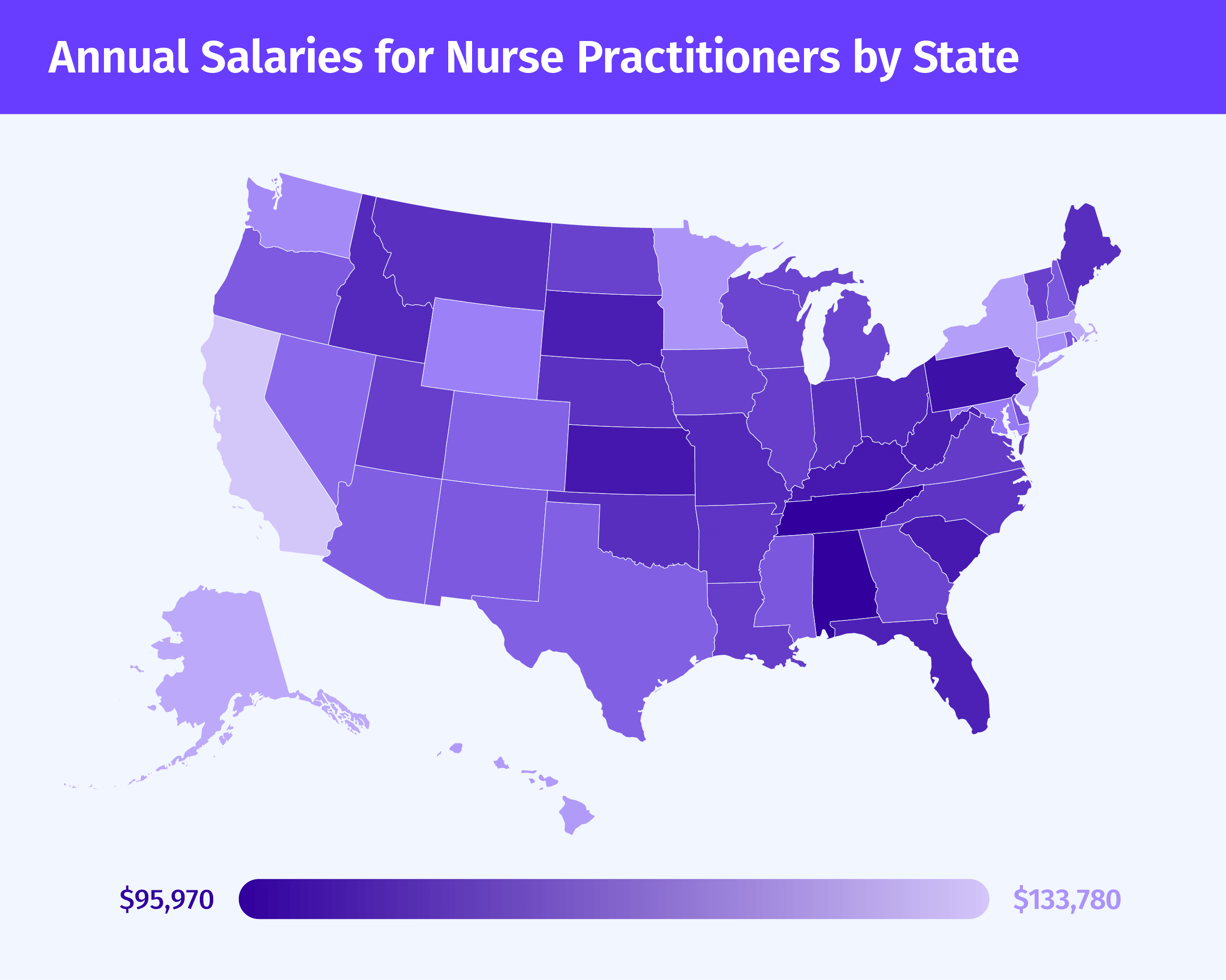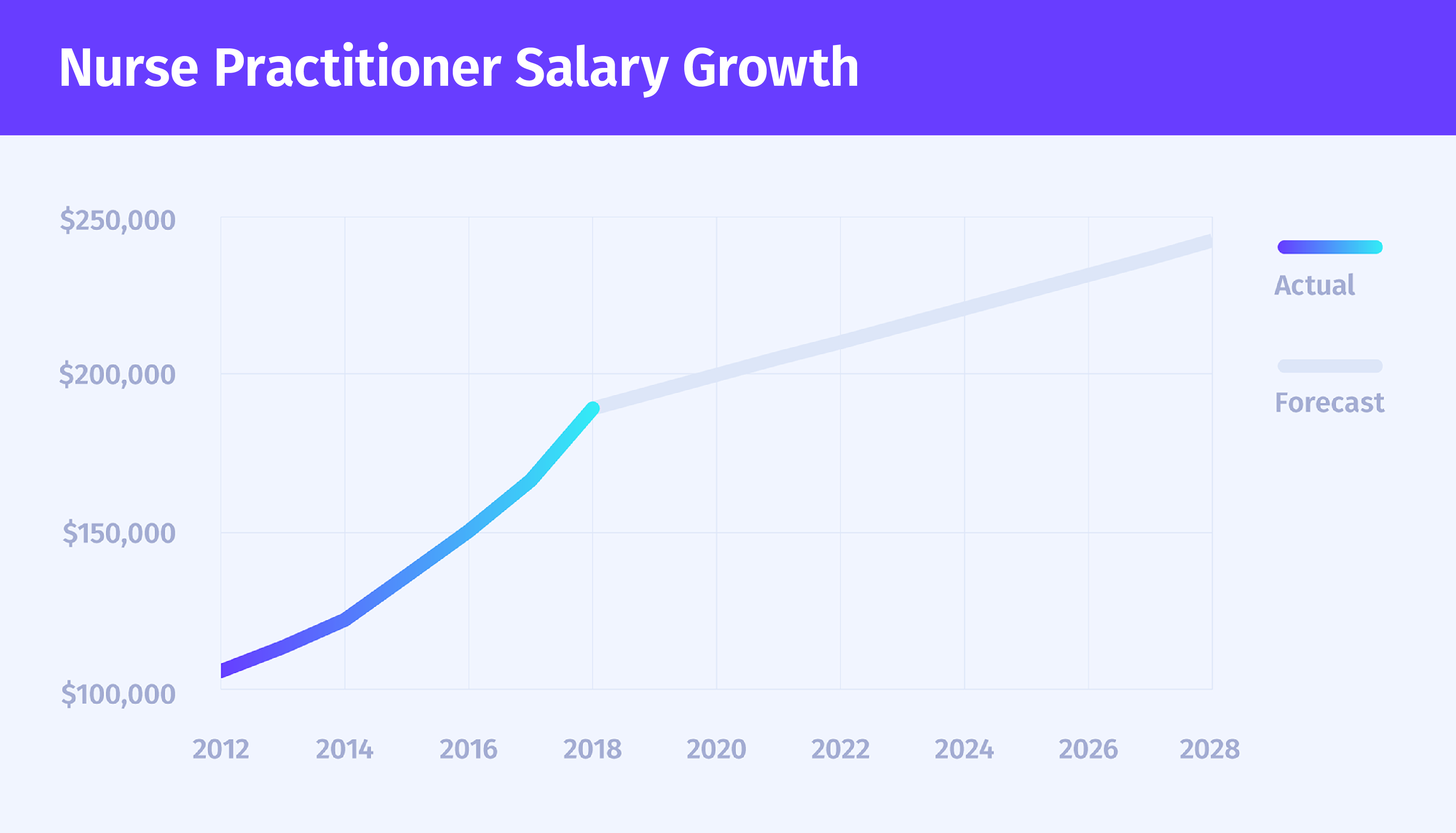- Steps to Become a Nurse Practitioner
- 1. Earn a Bachelor of Science in Nursing (BSN) Degree
- 2. Gain clinical experience
- 3. Earn a Graduate Degree in Nursing
- 4. Pass the National Certification Exam
- 5. Obtain APRN State Licensure
- Nurse Practitioner Salaries by State
- Nurse Practitioner Job Outlook
- Nurse Practitioner Specialty Areas
- Frequently Asked Questions (FAQs)
- Nurse Practitioner Resources
- Final Thoughts
Nurse Practitioners (NPs) are among the most highly regarded healthcare professionals. With their advanced training and skills, Nurse Practitioners can bridge the gap between the need for primary care and the growing shortage of physicians.
Nurse Practitioner Basics: A Few Things to Know
Usual responsibilities for NPs include:
- Managing the overall care of clients
- Ordering, performing and interpreting diagnostic tests, including lab work and x-rays
- Diagnosing and treating acute and chronic conditions such as diabetes, high blood pressure, infections, and injuries
- Prescribing medications and other treatments
- Counseling
- Educating clients on disease prevention, health, and lifestyle choices
NPs can work in any healthcare setting. Depending on the area of specialization, NPs might work in hospitals, clinics, physician practices, hospice services, nursing homes, or public health. In some states, NPs can also open their own practices.
Job growth for NPs is outstanding. The need for NPs is expected to increase by 26% through 2028. The outlook for RNs is 12%, which is still significantly better than the average outlook of 7% for all occupations. Salaries for PNs are higher than for RNs, too. Although salaries vary by location, experience, and other factors, the national PN average is $105,546 per year, compared to $71,730 for RNs. (Source: Bureau of Labor Statistics)
Nurse Practitioners are an essential part of today’s health care landscape
According to the American Association of Nurse Practitioners (AANP), Americans make over a billion visits to NPs each year. Patients who use NPs as their primary care provider on average have fewer trips to the emergency room and shorter inpatient stays, as well as medication costs that are lower than average.
NPs also provide cost-effective care, regardless of their work setting. A review at a managed care organization (MCO) in Tennessee found that NPs delivered primary health care for 23% less than the average cost of other primary care providers; 21% fewer hospital admissions; and 24% less utilization of laboratory tests. (Spitzer, 1997)
For a Registered Nurse (RN) seeking to advance their career, specialize in a specific branch of medicine, and provide high-quality care to clients, becoming a Nurse Practitioner may be a rewarding path.
5 Steps to Become a Nurse Practitioner
- 1
Earn a Bachelor of Science in Nursing (BSN) Degree
In order to apply for a graduate nursing program, you must first obtain a bachelor of science in nursing (BSN). A BSN degree is becoming the minimum standard for many hospitals and health organizations. Since 1965, the American Nurses Association has recommended a four-year degree as the entry level for professional nursing. In 2000, the American Association of Colleges of Nursing published a Position Statement supporting a Baccalaureate Degree as minimum preparation.
RNs with an Associate Degree in Nursing (ADN) can obtain a BSN through a bridge program. An RN-to-BSN program builds on the education and experience of the ADN. Flexible scheduling and online courses make it easy to get a BSN, often within a few semesters.
About 12% of RN candidates fail the NCLEX-RN examination on the first try. Nurse Plus Academy has practice tests, flashcards, and a simulated question pool that can help you successfully prepare to sit for your examination.
- 2
Gain clinical experience
Nurse Practitioners require experience in their specialty. New RNs may not yet know which area is interesting, so general nursing offers a way to learn basic skills that will serve the nurse throughout their career. It’s also helpful to become familiar with hospital or organization policies and procedures, as well as non-clinical aspects of care, such as ICD codes and risk management.
Over time, the RN will recognize which specialty or population is most interesting and rewarding to work with. The NP program will require a certain amount of clinical experience in the specific chosen area, usually 1-2 years.
- 3
Earn a Graduate Degree in Nursing
NPs have at least Master of Science in Nursing (MSN) degree, and sometimes a Doctorate of Nursing Practice (DNP) in their area of focus. An MSN program focuses on the extensive training necessary to become an advanced practice registered nurse (APRN) in a specialty, such as acute care, adult, family, gerontology, neonatal, oncology, pediatric, psychiatric, and women’s health.
AANP states that, “Didactic and clinical courses prepare nurses with specialized knowledge and clinical competency to practice in primary care, acute care and long-term health care settings.” Completing the requisites for an APRN can take 2-4 years.
- 4
Pass the National Certification Exam
After graduating with an MSN, the next step is to obtain certification from the national accrediting organization. Depending on the specialty, examinations are administered by the American Academy of Nurse Practitioners (AANP), American Nurses Credentialing Center (ANCC), Pediatric Nursing Certification Board (PNCB), and National Certification Corporation (NCC).
The examination process is similar to the NCLEX-RN to obtain a nursing license. Study guides and preview tests are available for all NP specialties. After passing the national certification examination, the nurse can add the appropriate credentials to their title.
- 5
Obtain APRN State Licensure
The same as when applying for an RN license, each state may have different requirements. (Get current state practice information here.) Generally, the process includes completing an application, submitting the appropriate fee, and following other conditions . Most states mandate fingerprints and a background check; the candidate is responsible for those fees, as well.
Part of the application process is providing proof of eligibility:
- An MSN degree or higher through an accredited graduate program
- National certification for a population focus recognized by the state
- A current, unencumbered RN license
After obtaining state licensure, the PN must maintain their practice within the professional boundaries set forth by their state board of nursing. Continuing education is required to maintain their license.
Nurse Practitioner Salaries by State
Becoming a Nurse Practitioner is a lucrative career path. It is well known that Nurse Practitioners frequently earn high incomes, often earning over $100,000 per year with an excellent employment outlook.
If you’re curious what kind of salary you can expect to earn in your state, we’ve created a chart below highlighting the employment, hourly wage, and annual wage that you can expect to earn in each state. The data comes from the U.S. Bureau of Labor Statistics (BLS) which is a government agency tasked with providing employment data for each state.
Take a look at the chart below to see the salary you can expect to earn in your state:

State Employment Hourly mean wage Annual mean wage Alabama 3,680 $46.14 $95,970 Alaska 440 $59.08 $122,880 Arizona 3,510 $53.25 $110,750 Arkansas 1,900 $50.15 $104,300 California 13,420 $64.32 $133,780 Colorado 2,920 $53.47 $111,210 Connecticut 2,340 $56.74 $118,020 Delaware 760 $52.09 $108,340 District of Columbia 840 $52.79 $109,800 Florida 10,590 $48.61 $101,100 Georgia 6,110 $51.32 $106,750 Hawaii 410 $57.96 $120,570 Idaho 750 $49.33 $102,600 Illinois 5,540 $50.86 $105,800 Indiana 4,780 $49.61 $103,200 Iowa 1,830 $51.10 $106,290 Kansas 2,270 $47.80 $99,430 Kentucky 3,160 $47.97 $99,790 Louisiana 2,820 $50.64 $105,340 Maine 1,240 $49.63 $103,220 Maryland 3,710 $55.32 $115,060 Massachusetts 6,200 $59.01 $122,740 Michigan 4,490 $51.39 $106,880 Minnesota 3,880 $57.29 $119,160 Mississippi 2,930 $52.74 $109,700 Missouri 4,390 $49.27 $102,470 Montana 640 $49.76 $103,510 Nebraska 1,070 $49.90 $103,800 Nevada 710 $54.11 $112,540 New Hampshire 1,140 $52.62 $109,460 New Jersey 5,900 $58.70 $122,100 New Mexico 980 $52.80 $109,810 New York 13,710 $58.16 $120,970 North Carolina 4,760 $50.05 $104,100 North Dakota 480 $51.06 $106,200 Ohio 7,510 $49.02 $101,970 Oklahoma 1,590 $49.65 $103,280 Oregon 2,030 $52.89 $110,010 Pennsylvania 7,280 $47.24 $98,250 Puerto Rico -- $10.05 $20,910 Rhode Island 690 $52.54 $109,290 South Carolina 2,260 $48.03 $99,910 South Dakota 540 $48.41 $100,690 Tennessee 7,010 $46.15 $95,990 Texas 12,020 $53.39 $111,060 Utah 1,380 $50.88 $105,840 Vermont 520 $50.96 $106,000 Virginia 4,710 $50.56 $105,170 Washington 3,430 $56.56 $117,650 West Virginia 1,080 $48.41 $100,690 Wisconsin 3,030 $51.34 $106,790 Wyoming 290 $55.78 $116,030 Nurse Practitioner Job Outlook
The overall growth for Nurse Practitioners is expected to be 26% from 2018 to 2028. This is due to an increase in demand for healthcare services:
- As America’s population ages, it will require more care for chronic conditions, as well as for geriatric clients. There will also be a need for more care for dementia and Alzheimer’s clients.
- Healthcare is extending to rural areas and locations that have previously had minimal access to direct services, PNs will provide primary care for these clients.
- Emphasis on prevention and education will give PNs the opportunity to serve clients in ways that increase health and reduce costs.
- NPs can perform many of the same services as physicians, often with more sensitivity and ability to spend time with clients.
Many states are changing laws regarding the NP scope of practice. NPs are being permitted to work independently, without having to work under supervision of a physician, or in collaboration of a physician.
With these considerations in mind, the overall job opportunities for Nurse Practitioners is expected to be excellent. Below you will find a chart highlighting the employment projections for Nurse Practitioners through 2028:

Nurse Practitioner Specialty Areas
Prior to entering NP graduate program, Nurse Practitioners must select a segment of the patient population that they would like to specialize in working with. This is known as the “population foci” and determines the type of course work and clinical training they will complete during their education.
After completing the required education for a specific patient population, prospective Nurse Practitioners may pursue certain sub-specializations within their chosen population foci. These sub specializations don’t require additional schooling but most of them require an additional certification exam.
There are six types of specialties that Nurse Practitioners must choose between before entering an accredited graduate level nursing program. Below you will find an overview of the different types of specialties:
Adult-Gerontology Nurse Practitioner (AGNP)

Average Salary: $98,198 *
Educational Requirements:
- MSN Degree
- AGNP board certification from the American Nurses Credentialing Center (ANCC)
Job Description:
AGNPs provide health care services to adults in clinics, family practice, home health service, and geriatric site settings. Acute care AGNPs focus on treating illness while primary care AGNPs focus more on illness prevention and the promotion of health and wellness.
Family Nurse Practitioner (FNP)

Average Salary: $93,525 *
Educational Requirements:
- MSN Degree
- FNP board certification from the American Nurses Credentialing Center (ANCC)
Job Description:
FNPs provide health care services to children and adults usually in a family practice or primary care setting. FNPs work with patients to maintain their health and wellness with an emphasis on preventative care.
Neonatal Nurse Practitioner (NNP)

Average Salary: $100,379 *
Educational Requirements:
- MSN Degree
- 2 years of work experience in an NICU (Neonatal Intensive Care Unit)
- NNP board certification from the American Nurses Credentialing Center (ANCC)
Job Description:
NNPs provide care to newborn infants with health complications in neonatal intensive care units (NICUs). NNPs focus on providing around the clock support for infants in critical condition and may also work with a neonatologist to assist with the delivery of newborns.
Pediatric Nurse Practitioner (PNP)

Average Salary: $89,275 *
Educational Requirements:
- MSN Degree
- PNP board certification from the American Nurses Credentialing Center (ANCC)
Job Description:
PNPs provide health care services to children ranging in age from 0-21 in pediatric clinics, schools, health departments, and physician offices. PNPs work with patients to maintain their health, prevent disease, and to educate family members on plans of care.
Psychiatric-Mental Health Nurse Practitioner (PMHNP)

Average Salary: $103,426 *
Educational Requirements:
- MSN Degree
- PMHNP board certification from the American Nurses Credentialing Center (ANCC)
Job Description:
PMHNPs provide mental health care services to patients dealing with mental illness in a variety of settings such as hospitals, military facilities, schools, correctional facilities, and other locations where they may be needed, including private practice. PMHNPs work with patients to assess their mental health needs, provide counseling and prescribe medication.
Women’s Health Nurse Practitioner (WHNP)

Average Salary: $90,734 *
Educational Requirements:
- MSN Degree
- WHNP board certification from the American Nurses Credentialing Center (ANCC)
Job Description:
WHNPs provide health care services to women of all ages in family planning clinics, OB-GYN clinics, and primary care settings. PNPs work to meet the unique health care needs of women and to treat acute and chronic health problems.
Frequently Asked Questions (FAQs)
How long does it take to become a nurse practitioner?
Becoming a Nurse practitioner takes around 4 to 7 years. There are three phases you will have to go through before you can become a Nurse Practitioner.
- Become an RN: 2 to 4 years
- Earn your masters degree in nursing (MSN): 2 to 3 years
- Earn an advanced practice registered nurse (APRN) certificate: Less than 1 year
The first step is to become an RN which can be done by completing certain associate level programs or by completing your bachelors of science nursing degree (BSN). Many masters degree level programs require you to have a BSN so this is the path most prospective Nurse Practitioners take.
The second step is to earn your MSN degree which is a masters level degree focusing on one of the six “population foci” or patient populations which allows you to receive specialized training that you will need to pass the national certification exam.
The final step is to take an exam to earn a certificate in one of the nursing specialties. The prerequisite to this test is to have the educational requirements fulfilled by completing a masters level degree in one of the six nursing specialties. After receiving your degree you will qualify to take one of the APRN certificates administered by the American Nurses Credentialing Center (ANCC).
Is it worth becoming a nurse practitioner?
With a high starting salary, opportunity for career advancement and a strong job satisfaction, becoming a Nurse Practitioner is definitely worth it for those willing to put in the time and effort. Nurse Practitioners are held in high regard within the community and their work has a direct impact on the lives of people in the communities they serve.
Can an NP work as an RN?
Nurse Practitioners are actually what is considered an advanced practice registered nurse or APRN. So to become an NP one must first become an RN. NPs are a type of RN that has more advanced education and specialized training than a regular RN.
Can you become a NP online?
Yes, you can become an RN by completing an accredited online program. The majority of the programs are geared toward individuals who have already obtained their RN license and an undergraduate nursing degree. Although the majority of coursework can be completed online, candidates will still have to complete a certain number of clinical practice hours at a healthcare facility. Generally, these practice hours are completed at a hospital or other local medical facility.
Can you go straight from BSN to NP?
While there is no way to skip the educational requirements necessary to obtain an MSN degree, there are programs such as the BSN to NP degree that allows students to take graduate level courses that will apply toward their MSN. This can help shorten the time it takes to obtain a MSN degree after graduating with a BSN.
Are Nurse Practitioners in demand?
Yes, Nurse Practitioners are in high demand and job growth will continue at a projected pace of 28% from 2018-2028. There is a growing need for NPs due to several factors including a nationwide shortage of physicians and the Baby Boom generation reaching an age where they need additional health care services.
Nurse Practitioner Resources
Below you’ll find some helpful resources as you navigate your way through the process of becoming a Nurse Practitioner. These organizations were created to provide helpful information, tools, and resources for those just beginning their career as well as those already working in the medical field as an NP. An important part of becoming an NP is staying informed about current issues facing the industry and continually striving to learn and become better within your role.
American Academy of Emergency Nurse Practitioners (AAENP)
The AAENP is an organization that seeks to create guidelines for the quality and safety of emergency care and encourage NPs to continue their clinical education. They also support training, education and research in emergency care.
American Association of Nurse Practitioners (AANP)
AANP is an advocacy group devoted to helping NP’s with information, tools and resources. They are the largest national membership association for NP’s and their goal is to “Empower all NP’s to advance quality health care through practices, education, advocacy, research and leadership”.
American Academy of Nurse Practitioners (AANPCB)
The AANPCB is an autonomous national certification board whose purpose is to assess entry level NPs knowledge and practice competencies and to assure patients that professional standards of practice have been met.
The Journal for Nurse Practitioners (JNP)
The JNP provides resources and information including peer-reviewed articles, research and continuing education to NPs to help them succeed in their roles. JNP also advocates on behalf of NPs and is an official publication of the American Association of Nurse Practitioners (AANP).
Gerontological Advance Practice Nurses Association (GAPNA)
GAPNA is the premier professional organization that represents the interests of advanced practice nurses who care for older adults. Advanced practice nurses are active in a variety of settings across the health care continuum including primary, acute, post-acute care, home care, and long-term care. GAPNA provides opportunities for education, leadership, research, advocacy, networking, and advancement of evidence-based care for older adults.
National Association of Pediatric Nurse Practitioners (NAPNAP)
The NAPNAP is the professional association for pediatric nurse practitioners (PNPs) and is dedicated to improving the quality of health care for infants, children and adolescents. They also advocate on behalf of PNPs to advance their role in providing pediatric care.
Nurse Practitioners in Women’s Health (NPWH)
The National Association of Nurse Practitioners in Women’s Health’s (NPWH) mission is to ensure the provision of quality primary and specialty healthcare to women of all ages by women’s health and women’s health focused nurse practitioners. Our mission includes protecting and promoting a woman’s right to make her own choices regarding her health within the context of her personal, religious, cultural, and family beliefs.
Final Thoughts
If you’ve been considering becoming a Nurse Practitioner you can rest assured that this is a very rewarding career path and one which has a strong starting wage and opportunities for career advancement. One unique thing about becoming an NP is that you get to concentrate on one specific specialty so if there is a certain type of nursing that excites you then becoming an NP will allow you to become an expert in that field.
Keep in mind, the starting point for any NP is to become an RN. As part of the process for becoming an RN you will have to pass the NCLEX exam which you will need to take after graduating from a nursing program. The exam consists of between 75 and 265 questions and you have six hours to complete the exam.
With a 12% first time failure rate it is imperative that you thoroughly prepare for NCLEX by choosing a comprehensive study guide to fully prepare yourself. Luckily, Nurse.Plus offers a comprehensive study guide to help you pass the NCLEX on the first try. If you’d like to see what the exam is like and get started on becoming a Nurse Practitioner, check out our free NCLEX practice questions.

 Reviewed by
Reviewed by 

